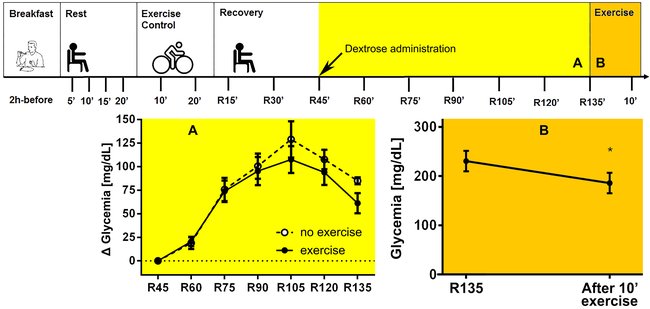-
Home
-
About JCTR
-
Gold Open Access
-
Issues
-
Editorial board
-
Author guidelines
-
Publication fees
-
Online first
-
Special issues
-
News
-
Publication ethics
-
Partners
-
Submit your manuscript
-
Submit your review report
-
Editorial Office
-

This work is licensed under a Creative Commons Attribution-NonCommercial 4.0 International License. ISSN print: 2382-6533 ISSN online: 2424-810X
Volume 1 Issue 1
Effects of prior exercise on glycemic responses following carbohydrate ingestion in individuals with type 2 diabetes
Gisela Arsa, Laila Cândida de Jesus Lima, Daisy Motta-Santos, Lucieli Teresa Cambri, Carmen Silvia Grubert Campbell, John Eugene Lewis, Herbert Gustavo Simões
Arsa et al., J Clin Transl Res, 2015; 1(1): 22-30
Published online: 17 July, 2015
Abstract
Background: Exercise is effective in reducing glycemia, especially when it is performed in the postprandial
period. However, no consensus exists in the literature about the effect of exercise on postprandial glucose
control when it is performed before carbohydrate consumption.
Aims: The main aim was to determine whether 20 min of exercise performed prior to carbohydrate consumption
reduces postprandial glycemic and insulinemic responses. A secondary aim was to analyze the effectiveness
of short-term (10 min) exercise bout with respect to postprandial glycemia reduction.
Methods: Nine individuals with type 2 diabetes (54.9 ± 1.7 years; 30.7 ± 1.8 kg/m²; glycemia level of 167.0
±10.6 mg/dL) participated in the study and underwent the following procedures: (a) an incremental test to
determine the lactate threshold; (b) an exercise session for 20 minutes at moderate intensity (90% of the lactate
threshold); and c) a control session. The last two sessions were randomized, and the participants were
monitored during 135 minutes of post-exercise recovery. A standard meal was consumed two hours before the
experimental procedures started. A dextrose solution was administered at 45 minutes of post-exercise recovery
while monitoring glucose and insulin concentrations. At 135 min of post-exercise recovery, eight of the
participants performed an additional 10-min exercise bout following induced hyperglycemia.
Results: Exercise reduced glycemia (−46.6 ± 7.9 mg/dL) and the insulin/glucose ratio (from 1.73 ± 0.59 to
0.93 ± 0.22 μU/mL/mmol/L) during the first 45 minutes of post-exercise recovery. Glycemia was significantly
increased after carbohydrate consumption, reaching its peak value at 105 minutes of post-exercise recovery
(261.8 ± 15.8 mg/dL) or control (281.3 ± 13.4 mg/dL). There was no effect of the previous exercise in attenuating
glycemia or reducing the area under the curve for glucose and insulin after carbohydrate consumption.
However, the effectiveness of exercise in reducing glycemia was shown again when it was performed at the
end of the experimental session, even in case of only a 10-min exercise (reduction of −44.5 ± 4.9 mg/dL).
Conclusions: Twenty minutes of moderate exercise does not alter the kinetics or the area under the curve in
terms of glycemia and insulinemia after subsequent carbohydrate consumption. However, moderate exercise,
even if performed for only 10-20 minutes, is effective in reducing postprandial glycemia in individuals with
type 2 diabetes.
Relevance for patients: Moderate-intensity exercise, even of short duration, may benefit individuals with
type 2 diabetes on blood glucose control. A fast reduction in postprandial glycemia can be obtained with only
ten minutes of exercise that, in turn, may ameliorate some of complications associated with the disease.
Published online: 17 July, 2015
Handling editor:
Michal Heger
Department of Experimental Surgery, Academic Medical Center, University of Amsterdam, Amsterdam, the Netherlands

DOI: http://dx.doi.org/10.18053/jctres.201501.002
Author affiliation
1 Department of Physical Education, Universidade Federal de Mato Grosso, Cuiabá, MT, Brazil
2 Department of Physical Education, Universidade Católica de Brasília, Brasília, DF, Brazil
3 Department of Physiology and Biophysics, Universidade Federal de Minas Gerais, Belo Horizonte, MG, Brazil
4 Physical Education post-graduation Program, Universidade Católica de Brasília, Taguatinga, DF, Brazil
5 Department of Psychiatry and Behavioral Sciences, University of Miami, Miller School of Medicine, Miami, FL, U.S.A.
*Corresponding author:
Gisela Arsa
Universidade Federal de Mato Grosso
Av. Fernando Correa, n. 2367
Ginásio de Esportes
NAFIMES, sala 2.
CEP 78060-900
Boa Esperança, Cuiabá, Mato Grosso, Brazil
Email: gisarsa@gmail.com

